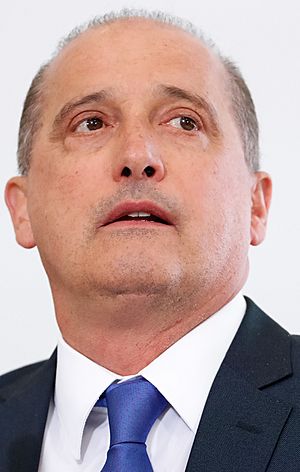Onyx Lorenzoni facts for kids
Quick facts for kids
Onyx Lorenzoni
|
|
|---|---|
 |
|
| Member of the Chamber of Deputies | |
| In office 1 February 2003 – 31 January 2023 |
|
| Constituency | Rio Grande do Sul |
| Minister of Labour and Social Security | |
| In office 26 July 2021 – 31 March 2022 |
|
| President | Jair Bolsonaro |
| Preceded by | Caio Vieira de Mello |
| Succeeded by | José Carlos Oliveira |
| General Secretary of the Presidency | |
| In office 12 February 2021 – 26 July 2021 |
|
| President | Jair Bolsonaro |
| Preceded by | Jorge Oliveira |
| Succeeded by | Luiz Eduardo Ramos |
| Minister of Citizenship | |
| In office 18 February 2020 – 12 February 2021 |
|
| President | Jair Bolsonaro |
| Preceded by | Osmar Terra |
| Succeeded by | João Roma |
| Chief of Staff of the Presidency | |
| In office 1 January 2019 – 18 February 2020 |
|
| President | Jair Bolsonaro |
| Preceded by | Eliseu Padilha |
| Succeeded by | Walter Braga Netto |
| Member of the Legislative Assembly of Rio Grande do Sul | |
| In office 1 January 1995 – 1 January 2003 |
|
| Constituency | At-large |
| Personal details | |
| Born |
Onyx Dornelles Lorenzoni
3 October 1954 Porto Alegre, Rio Grande do Sul, Brazil |
| Political party | PL (2022–present) |
| Other political affiliations |
|
| Parents |
|
| Education | Federal University of Santa Maria (BA) |
Onyx Dornelles Lorenzoni (born 3 October 1954) is a Brazilian politician and businessman. He also worked as a veterinarian. He is a member of the Liberal Party (PL).
He served as a federal deputy for Rio Grande do Sul for five terms. A federal deputy is like a representative in the country's main law-making body. After the 2018 Brazilian general election, the president-elect Jair Bolsonaro asked Lorenzoni to be his Chief of Staff. This role is like a top advisor to the president. He also led the team that helped the new government get started.
In 2022, he ran to become the governor of Rio Grande do Sul. He won the first round of the election with 37.5% of the votes. However, he did not win in the second round. He received 42.88% of the votes, losing to Eduardo Leite.
Contents
Biography: Onyx Lorenzoni's Political Journey
Onyx Lorenzoni started his political career in 1994. He was elected as a State Deputy for Rio Grande do Sul. He was part of the Liberal Party (PL) at that time.
Becoming a Federal Deputy
In 2003, he became a Federal Deputy. He was then part of the Liberal Front Party (PFL). As a federal deputy, he was known for disagreeing with the government of President Luiz Inácio Lula da Silva. He also opposed the Workers' Party (PT).
Key Investigations in Congress
During his time in the Chamber of Deputies, Lorenzoni was part of special committees. These committees investigated important issues. For example, he helped investigate matters related to Correios (the postal service) and Petrobras (a large oil company).
Important Votes and Reforms
In 2016, Lorenzoni voted for the impeachment of President Dilma Rousseff (PT). Impeachment is a process to remove a president from office. During the government of Michel Temer (MDB), Lorenzoni supported some big changes. These included a new tax rule and changes to labor laws. In 2017, he voted against reports that tried to accuse President Temer of wrongdoing.
Personal Life and Health
Onyx Lorenzoni is a member of the Evangelical Lutheran Church of Brazil. In June 2020, he was diagnosed with COVID-19.
Onyx Lorenzoni's Stances on Key Issues
Onyx Lorenzoni has taken clear positions on several important topics. These include fighting corruption and legal rules.
Fighting Corruption: Measures and Proposals
In 2016, Lorenzoni was part of a group that worked on new laws to fight corruption. These laws were based on ideas from the Federal Public Prosecutor's Office. He presented different versions of a report to make these ideas into law.
Developing Anti-Corruption Laws
One version of his report suggested punishments for using undeclared money in elections. This is sometimes called "caixa 2." Another version set sentences for people who used such funds in campaigns. The committee eventually approved a version with 20 changes. This version aimed to make corruption a more serious crime. It also sought to punish those who act on behalf of candidates.
Supporting Prison After Second Conviction
In October 2016, Lorenzoni supported a decision by the Supreme Federal Court. This decision allowed people to be sent to prison after being found guilty a second time. He said he would include this rule in the anti-corruption measures. He believed this would help ensure justice.
Views on Legal Immunity
In November 2016, Lorenzoni spoke about legal immunity. This is a protection that some politicians have from being prosecuted. He said he was against it. He felt that there was a feeling of unfairness in the country. He hoped that politicians would listen to the public's desire for fairness.
See also
 In Spanish: Onyx Lorenzoni para niños
In Spanish: Onyx Lorenzoni para niños
- Anti-corruption
- Chamber of Deputies
- Corruption in Brazil
 | Kyle Baker |
 | Joseph Yoakum |
 | Laura Wheeler Waring |
 | Henry Ossawa Tanner |

